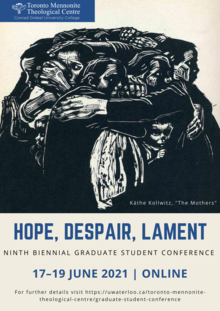About
Every other year the Toronto Mennonite Theological Centre (TMTC) hosts a Graduate Student Conference. One of the only conferences of its kind, its purpose is to provide Mennonite graduate students an opportunity to present their academic research with other graduate students in an interdisciplinary context and interact with each other as colleagues. The location for the conference rotates between various Mennonite academic institutional supporters of TMTC.
Ninth Biennial Graduate Student Conference
 Hope, Despair, Lament
Hope, Despair, Lament
The ninth biennial Graduate Student Conference hosted by the Toronto Mennonite Theological Centre will explore the theme of hope, despair, lament. The primary purpose of the conference is to provide a forum for graduate students who work on Anabaptist/Mennonite related topics and/or who identify with Anabaptist/Mennonite traditions to present their ongoing academic research in an interdisciplinary context and engage with each other as colleagues and peers.
O Lord, how long shall I cry for help, and you will not listen? Or cry to you “Violence!” and you will not save? Habakkuk 1:2 (NRSV)
What is the role of hope, despair, and lament for a people of peace in a world marked by polarization, violence, and ecological catastrophe? How might church make sense of an uncertain future, and what possible futures might emerge from and for the church? Are there resources within Anabaptist/Mennonite faith traditions that speak to our current moment? The ninth biennial Graduate Student Conference hosted by the Toronto Mennonite Theological Centre (TMTC) invites you to help us explore these and related questions.
The Planning Committee is delighted to announce that the conference has been rescheduled for 17–19 June 2021. Our theme has taken on an unanticipated new dimension in light of the ongoing global pandemic and though we will not be able to gather in-person, we are looking forward to what promises to be a very enriching few days of scholarly dialogue and conversation.
While the planning committee is disappointed that even a year long postponement we are still not able to gather in person, we have incorporated some non-zoom related aspects into the conference that we hope will foster some community-building opportunities. While we will be using Zoom for all of the main conference sessions, we will also be using both Padlet and Wonder and encourage you to dive into and make use of these additional two platforms with us. For those of you that may not be familiar with these, no dedicated account is required for any of them and we’ll walk you through how and when we’ll use these here:
- Zoom will be used for all of the main conference sessions. There will be one link for the entire conference. Concurrent sessions will utilize breakout rooms and you will be able to choose which session you wish to attend.
- Padlet, a text and photo-based platform, will be used before the conference begins as a way for us to introduce ourselves to each other as well as during the conference as a way for us to continue the conversation. The conference Padlet link is now live with introductions and photos of the planning committee. We encourage you to introduce yourself and take a photo at some point in the weeks leading up to the conference and bookmark the link so you can come back and get to know who else will be participating.
- Wonder, a virtual space where people can meet and talk, will be used as an informal virtual arrivals space before the conference begins on Thursday afternoon, for the virtual supper on Thursday evening, the afternoon coffee break on Friday, as well as between sessions for those that want a space to continue the kinds of “hallway conversations” that often ensue after and in-between sessions.
Again, none of these online platforms requires a dedicated account and there are on-screen instructions available to assist you. We hope these will be fairly intuitive to use but please also feel welcome to reach out directly to us by email if you need any assistance whatsoever. Please note that for security reasons, conference links to Zoom, Padlet, and Wonder will not be posted online and will be sent to all registered participants directly by email. Please do not post these online or forward them to others.
Becuase we have moved the conference online, registration is free.
The full conference schedule is now available and we are delighted to be welcoming 24 different presenters from 20 different institutions across North America and beyond. Please note that all times listed are local Toronto time, which is currently Eastern Daylight Time (EDT) or UTC-4.
As part of our attempt to foster community building spaces, the planning committee invites you to participate in a virtual supper on the first evening of the conference. We invite you to place an order at your favourite local restaurant for delivery between 17:30–18:00 (EDT) and join us online on Wonder where we will eat, talk, and get to know each other.
Finally, we are also excited to announce that we are hoping to publish some of the proceedings of the conference as a special themed issue of The Conrad Grebel Review. Those of you presenting at the conference that are interested in pursuing this are invited to submit full conference papers of between 6000–8000 words (including notes) formatted according to CGR guidelines directly by email to Kyle Gingerich Hiebert no later than 31 August 2021. All papers will be subject to a standard peer review process and though there is no guarantee of publication we encourage you to submit your paper for consideration and are excited about the possibilities of this special issue highlighting many up-and-coming scholars!
Should you have questions about any aspect of the conference, please feel welcome to contact us at any time.
Planning committee
Members of the planning committee for the 2021 conference include Benjamin Bixler, Gerald Ens, Hyejung Jessie Yum, and Kyle Gingerich Hiebert. Questions, comments, and suggestions are welcome and can be directed to TMTC.




